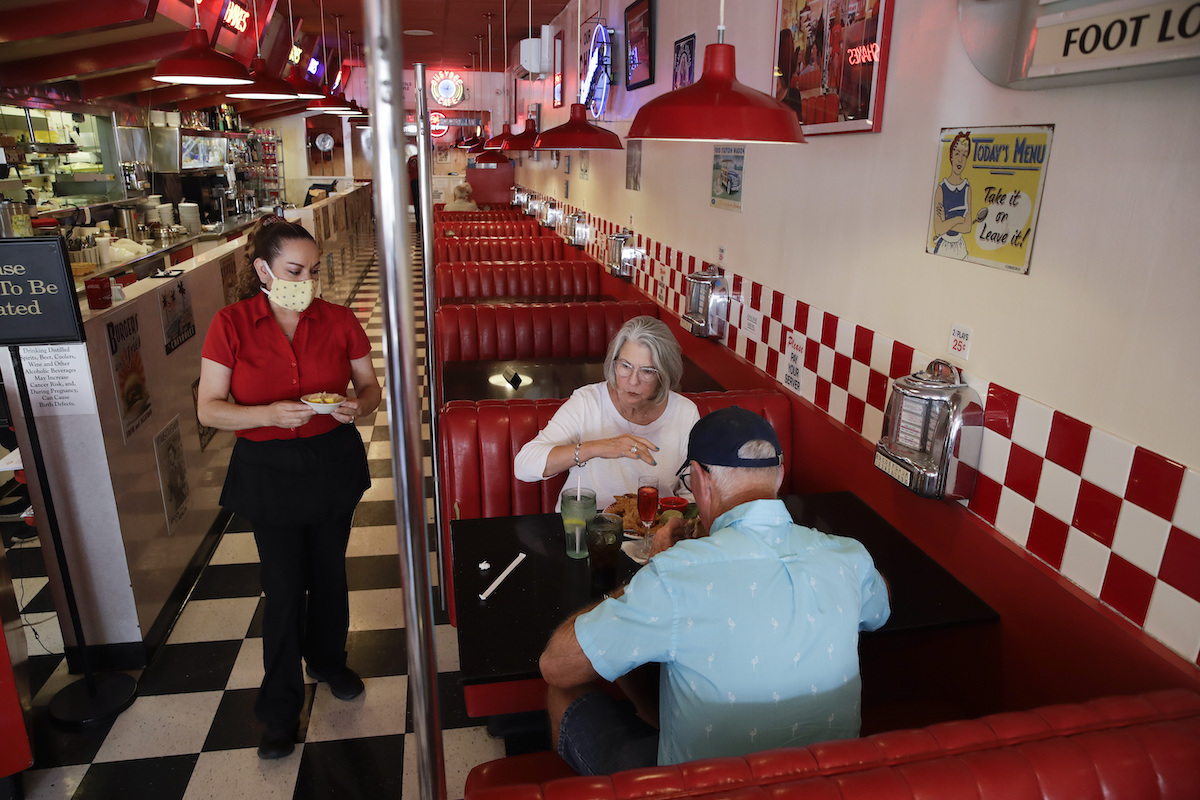

Lynn Tanner, center, and her husband Ryan, bottom right, are served lunch at Busy Bee Cafe Thursday, May 21, 2020, in Ventura, Calif. (AP Photo/Marcio José Sánchez)
LOS ANGELES — As the COVID-19 pandemic forces us to stay indoors as much as possible, I am struck by the responses that come from my social media friends. Everyone’s wearing a mask, emphasizing hygiene tips, and reminding others about the importance of staying home. A common thread I also noticed was their concern over the wet markets in Wuhan, China, where experts speculate the virus originated. However, they failed to acknowledge the similarities between wet markets and animal industries not just in America, but across the world.
When the first stories on COVID-19 came out, most people I knew (and online) weren’t as mortified by the virus as they were of the wet markets themselves. Walking into a live animal market sounds disturbing enough. One can’t fathom the unknown diseases crawling all over the place. The idea of selecting the blinking animal that will be executed, cooked, and served for your own benefit within the hour is grim. Soon, my Instagram friends were sharing footage from these wet markets on their stories: bats in stew, frogs stuffed in boxes, sliced intestines of God-knows-what on the floor, and so much more. It all sent a chill down my spine. But it also got to me.
My annoyance wasn’t toward the floods of explicit content, but the hypocrisy of those I followed. As someone who transitioned into veganism nearly a year ago, I am a newer member of the vegan community, but I still couldn’t take their sympathy seriously. The same people I saw boohooing about the wet markets weren’t vegans, vegetarians, or even pescatarians. In their eyes, eating something other than what they were used to seeing in the frozen aisle was cruel, inhumane, and wrong. Some were even bold enough to add a comment that could be perceived as racist. I could recall my discomfort when I overheard a classmate sneer, “I don’t even know why they’re wearing masks everywhere they go when they’re the reason why it exists.”
Action has been taken to ban wet markets, but we fail to acknowledge the harsh conditions and wellbeing of the soon-to-be-slaughtered animals in the industrialized world. Maybe it’s because the truth is purposefully hidden from our eyes, and we can’t bear to watch the footage of what really happens behind closed doors. Chickens squeeze against each other in cages in the dark. Male chicks, the “undesirables” in the egg industry, suffocate in bags or are ground up alive. Pigs hang upside down and await to have their throats slit out. Bunnies and rats endure unnecessary cosmetics testing. Bees are fed an unhealthy, sugary alternative after being robbed of their honey. Cows collapse of exhaustion while being milked out and will join the others in the slaughterhouse when they have served their purpose (yes, dairy cows are eventually killed). So why is the remorse different?
By justifying our use of animals, we engage in speciesism, or the belief that certain species are more valuable than other species. This was the main reason why my online friends lost credibility. Not one person brought up the swine flu. Instead, they focused on demonizing wet markets, but by showing off their chicken wings the next hour, actively engaged in speciesism. To them, it was okay to eat animals they grew up with and anyone who ate otherwise was heartless, but my observations contradict these claims. Regardless of racial or cultural backgrounds, I see that many people are attracted to the idea of eating something out of their comfort zone. But it still doesn’t make it right.
It shouldn’t matter on what the species is, how they were raised, or how they’ll be executed. Animals might be different from us, but we can agree that they share the same interests as us: life, compassion, and liberty. We also claim we are against animal abuse but continue to eat our burgers, drink our milk, wear leather jackets, and pamper ourselves with “tested” makeup products. By justifying the sufferings of other species, we engage in speciesism. So what gives us the right to demonize wet markets while the rest of the animal industries we benefit from are just as barbaric?
It’s nearly impossible to share ideas as a vegan without getting called overbearing, preachy, brainwashed, radical or just plain annoying. The most I could do was share the facts on social media without directly calling anyone out. Not a lot of people are willing acknowledge the harsh reality of what all animals endure for our own benefit. It’s true; I was once that person. But what I’ve also learned in my vegan journey is that it is never too late to educate ourselves, recognize our faults, and make changes in our lifestyles.
***
Elizabeth “Liz” Romero is an English major at the California State University, Los Angeles. She splits her time between El Monte and Burbank.



Liz Romero-how eloquently you explained this. Great write-up! Kudos to you.